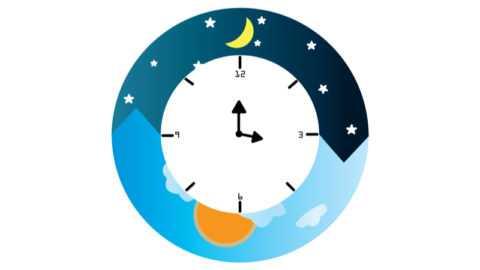Explore the World's Best Ideas
Join today and uncover 100+ curated journeys from 50+ topics. Unlock access to our mobile app with extensive features.
The Circadian Rhythm
- The circadian rhythm is what we call our body's masterclock. It is the timekeeper of the body which keeps the cells in our body running smoothly, helps fights against chronic diseases and assists us into having a peaceful night of sleep.
- Our circadian rhythm is dependent on our daily routines and diet that keeps us mindful of our health.
- Our masterclock can be found in the suprachiasmatic nuclei (SCN) in the hypothalamus. It is what controls the functioning of each bodily process.
376
2.03K reads
Healthy Circadian Rhythm
Healthy circadian rhythms rely on regularity and stability— for the timing of light, the timing of exercise, and the timing of meals.
Our bodies are accustomed to the exposure of light and darkness on a regular basis. The circadian rhythm is reset on a daily basis and it is the one that determines the healthiness of our cellular health and sleeping patterns.
329
1.52K reads
The Impact of Circadian Rhythms to Our Health
- We slowly deteriorate our health whenever we disrupt the natural cycle of our circadian rhythm. It becomes disrupted with every late nights, irregular meal times, and using our phones in the middle of the night.
- Extreme circadian instability is what happens when we do not take care of our internal clock. It often leads to a bunch of chronic health problems such as impaired immune function, obesity, and some forms of cancer.
- The key to reduce the risk of health problems, stability is needed.
350
1.37K reads
Reducing Circadian Instability
When you lack sleep, not only does your circadian rhythm go out of sync but it also further exacerbates difficulties with attention span, mood swings, and changes in memory.
Here are some things you can do to reduce your circadian instability:
- Minimize the number of your night shifts
- Have the same sleep-wake schedule whether you're at home or during the workdays
- Get some sunlight after waking up to cue in your biological clock and raise alertness levels.
362
1.34K reads
Mindfulness Meets Circadian Health
- It is essentially hard to keep track of a routine during times like these; screen time has risen more than usual, meals are often late, and a lot of midnights snacking.
- By practicing mindfulness it's easier to keep track of day-to-day habits. Mindfulness helps us by guiding us into making a choice on taking better care of ourselves mentally, physically, and emotionally.
- Practice mindfulness through breathing exercises or meditation. Recognize your thoughts and listen to what your body says.
321
1.58K reads
IDEAS CURATED BY
Ember P.'s ideas are part of this journey:
Learn more about health with this collection
Improving sleep through mindful breathing exercises
Practicing stress reduction and relaxation techniques
Establishing a relaxing bedtime routine
Related collections
Similar ideas
10 ideas
5 Natural Ways to Sleep Better
productive.fish
3 ideas
How Sleep Works: Understanding the Science of Sleep | Sleep Foundation
sleepfoundation.org
Read & Learn
20x Faster
without
deepstash
with
deepstash
with
deepstash
Personalized microlearning
—
100+ Learning Journeys
—
Access to 200,000+ ideas
—
Access to the mobile app
—
Unlimited idea saving
—
—
Unlimited history
—
—
Unlimited listening to ideas
—
—
Downloading & offline access
—
—
Supercharge your mind with one idea per day
Enter your email and spend 1 minute every day to learn something new.
I agree to receive email updates

